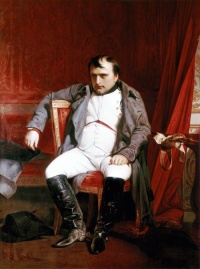Head of state
From The Art and Popular Culture Encyclopedia

Illustration: Napoléon Bonaparte abdicated in Fontainebleau (1845) by Paul Delaroche
|
Related e |
|
Featured: |
Head of state is the generic term for the individual or collective office that serves as the chief public representative of a monarchy, republic, federation, commonwealth or other kind of state. His or her role generally includes personifying the continuity and legitimacy of the state and exercising the political powers, functions and duties granted to the head of state in the country's constitution and laws. In nation states the head of state is often thought of as the official "leader" of the nation.
Charles de Gaulle described the role he envisaged for the French president when he wrote the modern French constitution, stating the head of state should embody "the spirit of the nation" for the nation itself and the world: une certaine idée de la France (a certain idea about France). Today many countries expect their head of state to embody national values in a similar fashion.
See also
- Head of government
- List of state leaders by year
- List of current heads of state and government
- List of heads of state by diplomatic precedence
- List of longest reigning current monarchs
- Air transports of heads of state and government
- List of heads of state educated in the United States
- Official residence
- World Leaders
- Political pensioner

